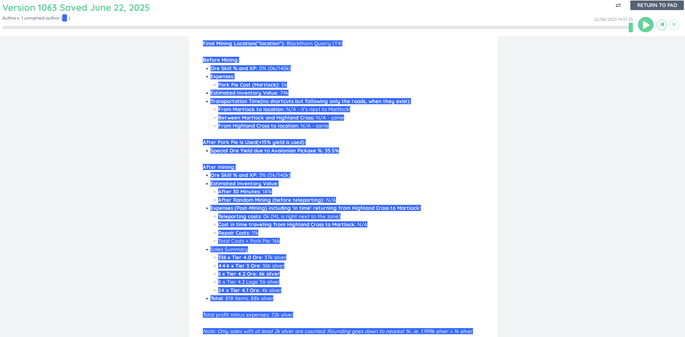2025-08-12 09:01:39
Long post, game design
Crungle is a game designed to be a simple test of general reasoning skills that's difficult to play by rote memory, since there are many possible rule sets, but it should be easy to play if one can understand and extrapolate from rules. The game is not necessarily fair, with the first player often having an advantage or a forced win. The game is entirely deterministic, although a variant determines the rule set randomly.
This is version 0.1, and has not yet been tested at all.
Crungle is a competitive game for two players, each of whom controls a single piece on a 3x3 grid. The cells of the grid are numbered from 1 to 9, starting at the top left and proceeding across each row and then down to the next row, so the top three cells are 1, 2, and 3 from left to right, then the next three are 4, 5, and 6 and the final row is cells 7, 8, and 9.
The two players decide who shall play as purple and who shall play as orange. Purple goes first, starting the rules phase by picking one goal rule from the table of goal rules. Next, orange picks a goal rule. These two goal rules determine the two winning conditions. Then each player, starting with orange, alternate picking a movement rule until four movement rules have been selected. During this process, at most one indirect movement rule may be selected. Finally, purple picks a starting location for orange (1-9), with 5 (the center) not allowed. Then orange picks the starting location for purple, which may not be adjacent to orange's starting position.
Alternatively, the goal rules, movement rules, and starting positions may be determined randomly, or a pre-determined ruleset may be selected.
If the ruleset makes it impossible to win, the players should agree to a draw. Either player could instead "bet" their opponent. If the opponent agrees to the bet, the opponent must demonstrate a series of moves by both players that would result in a win for either player. If they can do this, they win, but if they submit an invalid demonstration or cannot submit a demonstration, the player who "bet" wins.
Now that starting positions, movement rules, and goals have been decided, the play phase proceeds with each player taking a turn, starting with purple, until one player wins by satisfying one of the two goals, or until the players agree to a draw. Note that it's possible for both players to occupy the same space.
During each player's turn, that player identifies one of the four movement rules to use and names the square they move to using that rule, then they move their piece into that square and their turn ends. Neither player may use the same movement rule twice in a row (but it's okay to use the same rule your opponent just did unless another rule disallows that). If the movement rule a player picks moves their opponent's piece, they need to state where their opponent's piece ends up. Pieces that would move off the board instead stay in place; it's okay to select a rule that causes your piece to stay in place because of this rule. However, if a rule says "pick a square" or "move to a square" with some additional criteria, but there are no squares that meet those criteria, then that rule may not be used, and a player who picks that rule must pick a different one instead.
Any player who incorrectly states a destination for either their piece or their opponent's piece, picks an invalid square, or chooses an invalid rule has made a violation, as long as their opponent objects before selecting their next move. A player who makes at least three violations immediately forfeits and their opponent wins by default. However, if a player violates a rule but their opponent does not object before picking their next move, the stated destination(s) of the invalid move still stand, and the violation does not count. If a player objects to a valid move, their objection is ignored, and if they do this at least three times, they forfeit and their opponent wins by default.
Goal rules (each player picks one; either player can win using either chosen rule):
End your turn in the same space as your opponent three turns in a row.
End at least one turn in each of the 9 cells.
End five consecutive turns in the three cells in any single row, ending at least one turn on each of the three.
End five consecutive turns in the three cells in any single column, ending at least one turn on each of the three.
Within the span of 8 consecutive turns, end at least one turn in each of cells 1, 3, 7, and 9 (the four corners of the grid).
Within the span of 8 consecutive turns at least one turn in each of cells 2, 4, 6, and 8 (the central cells on each side).
Within the span of 8 consecutive turns, end at least one turn in the cell directly above your opponent, and end at least one turn in the cell directly below your opponent (in either order).
Within the span of 8 consecutive turns at least one turn in the cell directly to the left of your opponent, and end at least one turn in the cell directly to the right of your opponent (in either order).
End 12 turns in a row without ending any of them in cell 5.
End 8 turns in a row in 8 different cells.
Movement rules (each player picks two; either player may move using any of the four):
Move to any cell on the board that's diagonally adjacent to your current position.
Move to any cell on the board that's orthogonally adjacent to your current position.
Move up one cell. Also move your opponent up one cell.
Move down one cell. Also move your opponent down one cell.
Move left one cell. Also move your opponent left one cell.
Move right one cell. Also move your opponent right one cell.
Move up one cell. Move your opponent down one cell.
Move down one cell. Move your opponent up one cell.
Move left one cell. Move your opponent right one cell.
Move right one cell. Move your opponent left one cell.
Move any pieces that aren't in square 5 clockwise around the edge of the board 1 step (for example, from 1 to 2 or 3 to 6 or 9 to 8).
Move any pieces that aren't in square 5 counter-clockwise around the edge of the board 1 step (for example, from 1 to 4 or 6 to 3 or 7 to 8).
Move to any square reachable from your current position by a knight's move in chess (in other words, a square that's in an adjacent column and two rows up or down, or that's in an adjacent row and two columns left or right).
Stay in the same place.
Swap places with your opponent's piece.
Move back to the position that you started at on your previous turn.
If you are on an odd-numbered square, move to any other odd-numbered square. Otherwise, move to any even-numbered square.
Move to any square in the same column as your current position.
Move to any square in the same row as your current position.
Move to any square in the same column as your opponent's position.
Move to any square in the same row as your opponent's position.
Pick a square that's neither in the same row as your piece nor in the same row as your opponent's piece. Move to that square.
Pick a square that's neither in the same column as your piece nor in the same column as your opponent's piece. Move to that square.
Move to one of the squares orthogonally adjacent to your opponent's piece.
Move to one of the squares diagonally adjacent to your opponent's piece.
Move to the square opposite your current position across the middle square, or stay in place if you're in the middle square.
Pick any square that's closer to your opponent's piece than the square you're in now, measured using straight-line distance between square centers (this includes the square your opponent is in). Move to that square.
Pick any square that's further from your opponent's piece than the square you're in now, measured using straight-line distance between square centers. Move to that square.
If you are on a corner square (1, 3, 7, or 9) move to any other corner square. Otherwise, move to square 5.
If you are on an edge square (2, 4, 6, or 8) move to any other edge square. Otherwise, move to square 5.
Indirect movement rules (may be chosen instead of a direct movement rule; at most one per game):
Move using one of the other three movement rules selected in your game, and in addition, your opponent may not use that rule on their next turn (nor may they select it via an indirect rule like this one).
Select two of the other three movement rules, declare them, and then move as if you had used one and then the other, applying any additional effects of both rules in order.
Move using one of the other three movement rules selected in your game, but if the move would cause your piece to move off the board, instead of staying in place move to square 5 (in the middle).
Pick one of the other three movement rules selected in your game and apply it, but move your opponent's piece instead of your own piece. If that movement rule says to move "your opponent's piece," instead apply that movement to your own piece. References to "your position" and "your opponent's position" are swapped when applying the chosen rule, as are references to "your turn" and "your opponent's turn" and do on.
#Game #GameDesign










































![Comment by "adobriyan" showing the commit in question, which replaces a "struct hlist_head event_hash[EVENT_HASHSIZE] __read_mostly" with "DEFINE_HASHTABLE(event_hash, EVENT_HASH_BITS)"](https://mastodon-usw-cache.b-cdn.net/media_attachments/files/114/751/560/091/399/771/small/5281946bec86335d.png)











